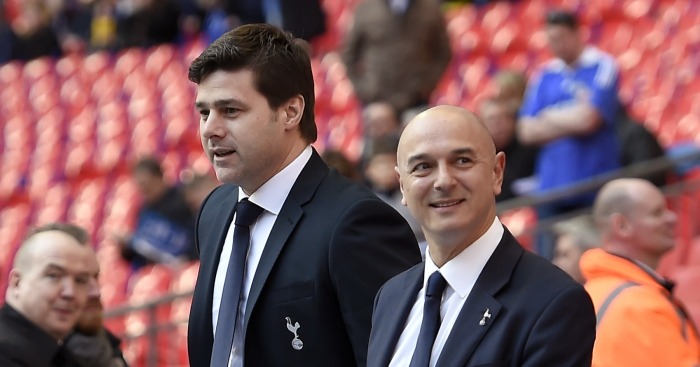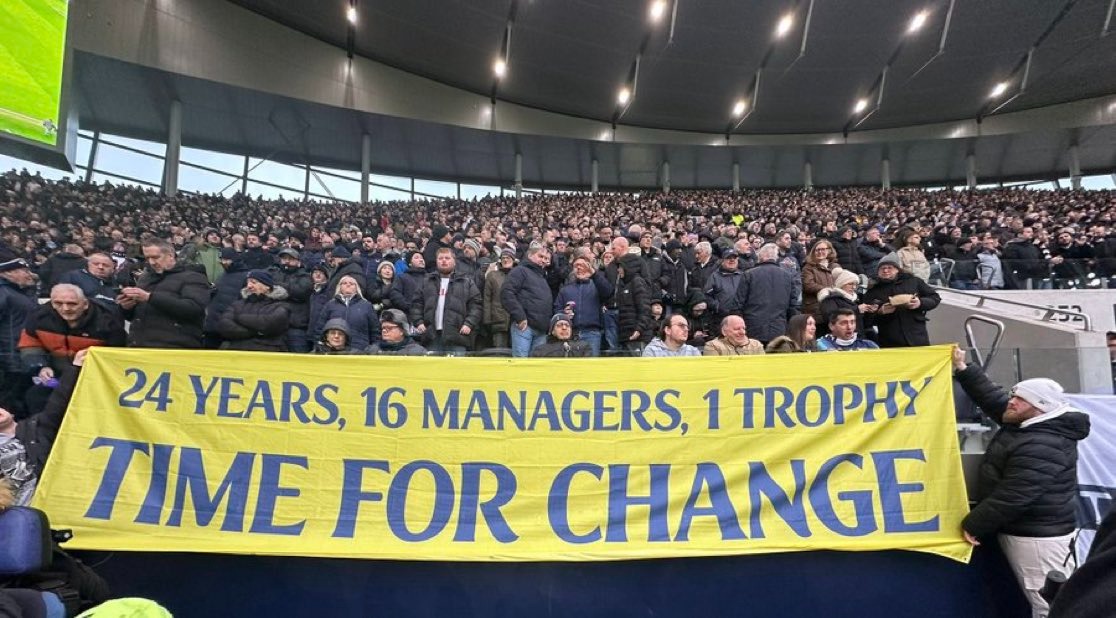The Fall of Daniel Levy
As criticism of the Tottenham Hotspur chairman intensifies amidst widespread protests, how did the ENIC project stutter and derail after steady progress.

It seems the scrutiny on Daniel Levy has reached its crescendo. For years, there have been periods of heightened frustration among the Spurs faithful, followed by periods of relative tranquility when a change in manager has temporarily reversed their fortunes and relieved pressure on the Tottenham Hotspur chairman.
But this time feels different. This time, despite Tottenham having one of their worst ever Premier League seasons, at one point sitting as low as 15th in the Premier League table after 23 games, the supporters haven't turned on the manager. In fact, throughout Spurs' turbulent 2024/25 season, manager Ange Postecoglou has mostly escaped the supporters' ire in the stadium, outside of a fiery confrontation on the south coast.
Perhaps this is because of an understanding of the sheer number of injuries Spurs have had to deal with this season. Or perhaps, after 16 managers over ENIC's 24 years at the helm of the club, it is clear Spurs' problems far exceed the coaching staff. Amongst all the recent protests, it is the banner referring to just this, along with "1 trophy", that has served the most damning indictment of Levy.

How did we get here? Although trophies have evaded the whole of Levy's reign, for so long it felt as though they were moving in the right direction. When ENIC took a controlling stake in Tottenham in 2001, they were a bang average mid-table club, having finished 10th or lower in seven out the last ten previous seasons.
Things didn't get off to a flying start, but five years down the line, Martin Jol guided Spurs into European competition for only the third and fourth times in 15 years, thanks to back-to-back 5th place finishes. There was a feeling Tottenham were a team on the up, a sleeping giant finally threatening to wake up in pursuit of former glories.
But the signs of Levy's ultimate shortcomings were beginning to emerge. Over the summer of 2007 tensions emerged between Jol and then director of football, Damien Comolli. Tottenham invested in youth, signing Darren Bent, Younes Kaboul, Adel Taraabt, Kevin-Prince Boateng and a certain Gareth Bale. But Jol felt the squad needed a couple of experienced players and later claimed: "I think the club wanted to invest in younger players because they wanted to make money on them in the future. The decisions were not being made for football reasons."
This, ultimately, has been Levy's biggest weakness. It is admirable how ENIC have grown the club in a sustainable way, without the backing of a state or oligarch. But to succeed in elite level sport, you must at some point take risks. Spurs were onto something with Jol, threatening to break into the top 4 which itself would've brought in additional revenue, but the ownership missed the opportunity to back their man.
Jol was famously "sacked at half-time" just a couple of months later, after a poor start to the season.
In came Juande Ramos, still the only manager to win silverware under ENIC's ownership, but he encountered the same issues as Spurs sold their star strike duo, Dimitar Berbatov and Robbie Keane the following summer, to replace them with Frazier Campbell on loan and Roman Pavlyuchenko. Similarly to Jol, Ramos was gone before the end of October.
And with the Abu Dhabi United group acquiring Manchester City in the summer of 2008, it seemed Tottenham might have missed their chance to break into the Champions League.
But the arrival of Harry Redknapp relieved the pressure on Levy. A year later, Spurs pipped Manchester City to 4th and Champions League football. What followed, despite a continued turnover in managers, was one of the most consistent periods in Tottenham's history. For 11 consecutive seasons they finished no lower than 6th, finishing in the top 4 on six occasions.
This was largely thanks to Mauricio Pochettino, who proved Levy's most inspired hire, bringing front foot, exciting football to N17 which culminated in Tottenham reaching the Champions League final for the first time in their history.
And off the pitch Levy was building Tottenham in a way which would genuinely re-establish them as an elite club. ENIC invested in world-class training facilities that are still the envy of other clubs, while developing plans for a new 60,000 seater stadium to replace the brilliant, but dated, White Hart Lane. Its easy to overlook just how important for Spurs' development this was. Of course, football is ultimately about on-the-pitch success, but even with greater investment during this period, Spurs were never going to be truly seen as a big club long term without a 'big club' stadium. And being able to show prospective signings the world-class training facilities at the Spurs Lodge is a potential deal-maker.
But it was during Pochettino's time that the seeds of Spurs' sudden decline were sown. After finishing 3rd, 2nd and 3rd in back-to-back seasons, rather than seize the opportunity to push on and finally win some silverware, Tottenham instead...did nothing. For 18 months they didn't sign a single player. No team had gone a whole summer without any incomings, since the introduction of transfer windows, but Levy, perhaps believing Pochettino's success meant investment was no longer required, kept the purse strings sealed.
Of course, it is likely that Pochettino had the option to buy some players still, as David Pleat has alluded to. But, if similarly to in Jol's managerial reign, these players were not of the calibre to come in and potentially improve the first team, what would be the point? Even the summer previous to this, after finishing with a record Premier League points tally of 86, Spurs sold one of their best players in Kyle Walker and brought in Davison Sanchez, Serge Aurier, Fernando Llorente, Juan Foyth and Paulo Gazzaniga. None of them made notable contributions in a Spurs shirt, other than Sanchez for a very short period.
There is a reason top teams continue to invest in players during times of success. Competition is needed to avoid complacency and even the greatest teams can become stale very quickly, as seen with Manchester City this season. Sir Alex Ferguson understood this and was a master at moving on players at the right time and brining in new ones to freshen things up. Spurs hadn't even achieved anything yet, they just needed those last few ingredients to find the winning formula. But Levy didn't take the necessary risk.
Once he finally somewhat backed Pochettino after the Champions League final defeat, it was too late. Too many in what had been such a brilliant Spurs side were past their peak and the additions of Tanguy Ndombele, Giovanni Lo Celso and Ryan Sessegnon were simply never going to be enough. Rather than stick with the manager through a tricky period, Levy sacked Pochettino in November 2019, once again serving notice to a manager he'd hung out to dry.
This was the end of Spurs' progress in the ENIC years and the beginning of the wheels coming off. The subsequent five years up to this point have only seen Spurs regress on the pitch. Jose Mourinho was appointed, a man who was never a fit for Tottenham and only proved the need for Levy to delegate to more effective footballing operators. 17 months later he was sacked.
Then came Nuno Espirito Santo, currently sitting third in the league with Nottingham Forest. He didn't even last four months. Antonio Conte, now top of Serie A with Napoli, lasted just 16, before blowing up spectacularly in a scarcely believable press conference. His number two, Christian Stellini was appointed for the remainder of the season, but was out the door before a month was up, requiring a second interim stint from Ryan Mason, after he had previously filled in following Mourinho's sacking.
Which brings us to number 16. Ange Postecoglou's reign started so brightly, with ten wins out of ten putting Spurs top of the league. But a lack of squad depth has been exposed by football's hectic schedule and a lack of appreciation from the Spurs hierarchy of the demands of 'Angeball.'
Before Tottenham's 1-0 victory over Manchester United, supporters marched down Seven Sisters Road and sat in after the full time whistle at the Tottenham Hotspur Stadium to make their anger at Levy heard. The protests received significant media coverage and Sky devoted a portion of Super Sunday to discussing the issues of Levy's ownership.
It feels as though the walls are closing in on Daniel Levy, but he is no stranger to criticism. He still attends every game in North London and clearly has thick skin. But the escape routes are disappearing for the Essex born businessman. This time, sacking the manager won't provide a get out option. For Levy to survive this, he must fully back Postecoglou with the necessary funds and wage structure overhaul to build the squad his high tempo football requires. And he must leave the negotiating to those entrusted with running recruitment. If he doesn't or Postecoglou fails there will truly be no way out this time and the protests will only further increase in volume.
0 Comments Add a Comment?